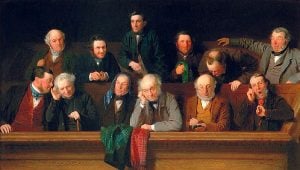
Ketanji Brown Jackson’s Double Jeopardy Opinion Protects The Authority Of Jury Decisions
//
 It is hard to look at the Ninth Amendment and see it as anything other than a deliberate attempt to protect The People from the threat of intensifying bureaucratization. It was well founded — just look at the judiciary. It seems like everyone has varying degrees of discretion: the prosecution can decide which laws to enforce and when, not to mention sheriffs and judges taking the law in their own hands. But the people? Prior to the nation’s formation at common law, juries not only judged both both matters of law and fact, but judges knew they weren’t to touch the decision. See former prosecutor Paul Butler’s Racially Based Jury Nullification: Black Power In The Criminal Justice System:
It is hard to look at the Ninth Amendment and see it as anything other than a deliberate attempt to protect The People from the threat of intensifying bureaucratization. It was well founded — just look at the judiciary. It seems like everyone has varying degrees of discretion: the prosecution can decide which laws to enforce and when, not to mention sheriffs and judges taking the law in their own hands. But the people? Prior to the nation’s formation at common law, juries not only judged both both matters of law and fact, but judges knew they weren’t to touch the decision. See former prosecutor Paul Butler’s Racially Based Jury Nullification: Black Power In The Criminal Justice System:
In the United States, the doctrine of jury nullification originally was based
on the common law idea that the function of a jury was, broadly, to decide justice, which included judging the law as well as the facts. If jurors believed that applying a law would lead to an unjust conviction, they were not compelled to convict someone who had broken that law. Although most American courts now disapprove of a jury’s deciding anything other than the “facts,” the Double Jeopardy Clause of the Fifth Amendment prohibits appellate reversal of a jury’s decision to acquit, regardless of the reason for the acquittal.’ Thus, even when a trial judge thinks that a jury’s acquittal directly contradicts the evidence, the jury’s verdict must be accepted as final. The jurors, in judging the law, function as an important and necessary check on government power.
This was commonplace and understood. Now, the jury is relegated to factual determinations as judges decide which laws are relevant. Georgia’s Supreme Court would have gutted the weight of a jury’s decision altogether but for the federal Supreme Court stepping in. And Justice Jackson’s intervention was decisive. From Slate:
 Sponsored Ontra’s Insight, Powered By GPT-4, Simplifies Fund Management From Ethan Beberness
Sponsored Ontra’s Insight, Powered By GPT-4, Simplifies Fund Management From Ethan Beberness The Supreme Court delivered a remarkable victory for the rights of criminal defendants on Wednesday, applying the constitutional bar against double jeopardy to prohibit a sneaky end run around a jury’s acquittal. Justice Ketanji Brown Jackson’s unanimous, uncompromising opinion for the court doubled as a strong endorsement of the right to trial by jury—including a jury’s unquestionable authority to acquit a defendant for any reason it chooses, including a belief that the charges are unjust. Jackson, the first former public defender to serve on SCOTUS, served up a forceful rebuke to the Georgia judiciary’s attempt to undermine this “inviolate” principle.
…
Jackson reasoned in her opinion on Wednesday: The Georgia Supreme Court got it wrong. To explain why, the justice went back to first principles. The Fifth Amendment states that no person may “be subject for the same offence [sic] to be twice put in jeopardy of life or limb.” That means that “a verdict of acquittal is final” and serves as “a bar to a subsequent prosecution for the same offense.” An acquittal encompasses “any ruling that the prosecution’s proof is insufficient to establish criminal liability for an offense.” A jury’s acquittal is “inviolate” and cannot be reviewed, let alone overturned, by a higher court. This “bright-line rule” preserves the jury’s duty “to stand between the accused and a potentially arbitrary or abusive government that is in command of the criminal sanction.”
This ruling is not only a win for juries and the Ninth Amendment but, as Mark Joseph Stern points out, the power of juries to nullify. It isn’t that slippery of a slope for an unchecked Georgia Supreme Court to decide that this jury’s decision was “valueless” and then go on to invalidate future verdicts that did not sit well with bureaucratic interests.
googletag.cmd.push( function() { // Display ad. googletag.display( "div-id-for-middle-300x250" ); }); googletag.cmd.push( function() { // Display ad. googletag.display( "div-id-for-storycontent-440x100" ); }); googletag.cmd.push( function() { // Display ad. googletag.display( "div-id-for-in-story-youtube-1x1" ); });The step beyond, and it is unsure if Justice Jackson would go this far, would be to rule the laws that prevent informing juries of their right to nullify as unconstitutional. As it stands, jury nullification is a boogeyman of the separation of powers rather than a tenet backed by the Ninth. If it is fair game to openly admit that juries can return verdicts that make not one lick of sense, then why should informing juries of what should be considered a right result in a conviction? This strong defense of judicial discretion is an opportunity to go all the way.
Turns Out It’s Really Useful to Have a Former Public Defender on the Supreme Court [Slate]
Sponsored Sponsored Ontra’s Insight, Powered By GPT-4, Simplifies Fund Management From Ethan Beberness
Sponsored Ontra’s Insight, Powered By GPT-4, Simplifies Fund Management From Ethan Beberness  Sponsored Establishing Trust In Generative AI
Sponsored Establishing Trust In Generative AI  Sponsored Are You Making A Good Impression On Your Clients? Over 1,000 legal services recipients share their perceptions of their lawyers in this new report. From InfoTrack and Above The Law
Sponsored Are You Making A Good Impression On Your Clients? Over 1,000 legal services recipients share their perceptions of their lawyers in this new report. From InfoTrack and Above The Law  Sponsored In-House Pros: Share Your Tech Thoughts For A Chance At A $250 Gift Card! The survey is anonymous, and in-house lawyers and legal ops professionals who participate will be eligible to win! From Above The Law
Sponsored In-House Pros: Share Your Tech Thoughts For A Chance At A $250 Gift Card! The survey is anonymous, and in-house lawyers and legal ops professionals who participate will be eligible to win! From Above The Law  Chris Williams became a social media manager and assistant editor for Above the Law in June 2021. Prior to joining the staff, he moonlighted as a minor Memelord™ in the Facebook group Law School Memes for Edgy T14s. He endured Missouri long enough to graduate from Washington University in St. Louis School of Law. He is a former boatbuilder who cannot swim, a published author on critical race theory, philosophy, and humor, and has a love for cycling that occasionally annoys his peers. You can reach him by email at [email protected] and by tweet at @WritesForRent.
Chris Williams became a social media manager and assistant editor for Above the Law in June 2021. Prior to joining the staff, he moonlighted as a minor Memelord™ in the Facebook group Law School Memes for Edgy T14s. He endured Missouri long enough to graduate from Washington University in St. Louis School of Law. He is a former boatbuilder who cannot swim, a published author on critical race theory, philosophy, and humor, and has a love for cycling that occasionally annoys his peers. You can reach him by email at [email protected] and by tweet at @WritesForRent.
 Sponsored In-House Pros: Share Your Tech Thoughts For A Chance At A $250 Gift Card! The survey is anonymous, and in-house lawyers and legal ops professionals who participate will be eligible to win! From Above The Law
Sponsored In-House Pros: Share Your Tech Thoughts For A Chance At A $250 Gift Card! The survey is anonymous, and in-house lawyers and legal ops professionals who participate will be eligible to win! From Above The Law  Sponsored Early Adopters Of Legal AI Gaining Competitive Edge In Marketplace How to best leverage generative AI as an early adopter with ethical use. From LexisNexis Topics
Sponsored Early Adopters Of Legal AI Gaining Competitive Edge In Marketplace How to best leverage generative AI as an early adopter with ethical use. From LexisNexis Topics Courts, Jury Nullification, Ketanji Brown Jackson, Supreme Court
Introducing Jobbguru: Your Gateway to Career Success
The ultimate job platform is designed to connect job seekers with their dream career opportunities. Whether you're a recent graduate, a seasoned professional, or someone seeking a career change, Jobbguru provides you with the tools and resources to navigate the job market with ease.
Take the next step in your career with Jobbguru:
Don't let the perfect job opportunity pass you by. Join Jobbguru today and unlock a world of career possibilities. Start your journey towards professional success and discover your dream job with Jobbguru.
Originally posted on: https://abovethelaw.com/2024/02/ketanji-brown-jacksons-double-jeopardy-opinion-protects-the-authority-of-jury-decisions/